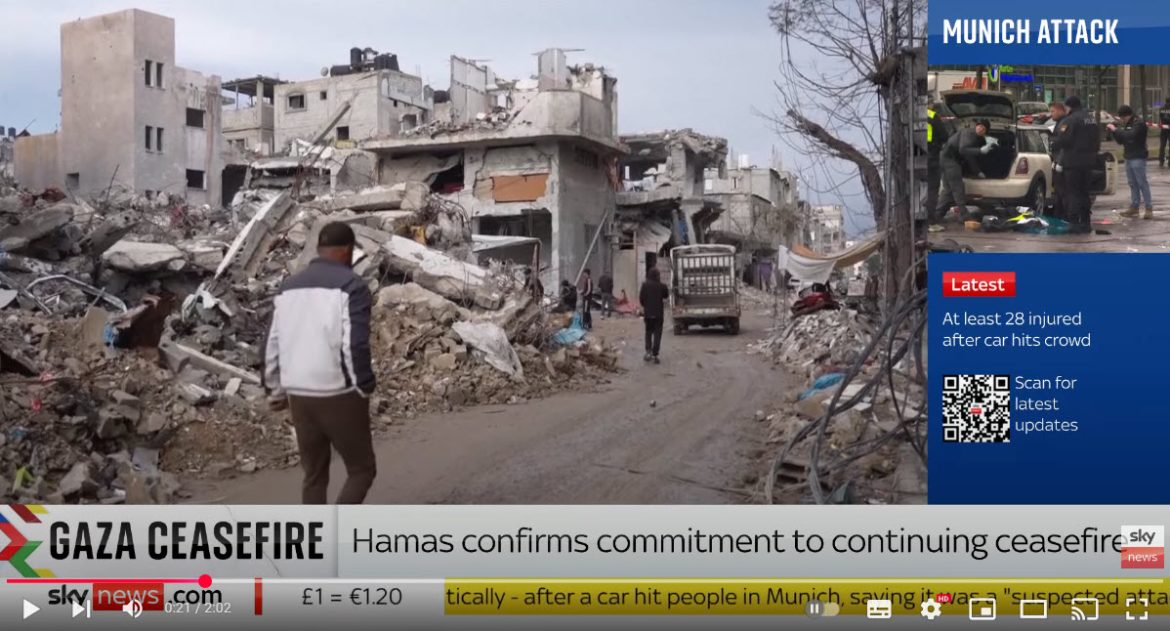In a critical development, Hamas has announced the planned release of three Israeli hostages, aiming to uphold the fragile ceasefire agreement with Israel. This decision comes after a period of heightened tensions, where Hamas accused Israel of failing to meet its obligations under the truce, particularly concerning the delivery of humanitarian aid and the facilitation of displaced Palestinians’ return to northern Gaza.
The hostages set for release include Israeli-Argentinian Iair Horn, Israeli-American Sagui Dekel-Chen, and Israeli-Russian Alexander Troufanov. In exchange, Israel has agreed to release 369 Palestinian prisoners, marking the sixth such exchange since the ceasefire commenced on January 19, 2025. To date, these exchanges have resulted in the liberation of 21 hostages and over 730 Palestinian detainees.
The ceasefire, brokered with the assistance of Egyptian and Qatari mediators, faced potential collapse when Hamas threatened to delay the hostage release, citing Israel’s alleged non-compliance with the truce terms. In response, Israeli Prime Minister Benjamin Netanyahu, supported by U.S. President Donald Trump, issued an ultimatum demanding the release of all hostages by a specified deadline, warning of a possible resumption of military operations. This high-stakes diplomacy underscores the delicate balance both parties are attempting to maintain to prevent a return to open conflict.
Despite the planned release, underlying issues persist. Hamas has expressed concerns over the insufficient delivery of tents and temporary shelters to Gaza, essential for the displaced population. Conversely, Israel has accused Hamas of ceasefire violations, including hindering the return of displaced persons and obstructing humanitarian aid efforts. These mutual recriminations highlight the challenges in implementing and sustaining the ceasefire agreement.
The international community continues to monitor the situation closely. U.S. Secretary of State Marco Rubio is scheduled to visit the region, engaging with leaders in Israel, Saudi Arabia, and the United Arab Emirates to discuss the ceasefire’s stability and explore avenues for a long-term resolution. Additionally, a Saudi Arabia-led summit is planned for February 20 to address President Trump’s controversial proposal for U.S. involvement in Gaza’s reconstruction and governance—a plan met with mixed reactions from regional stakeholders.
As the ceasefire teeters on a knife-edge, the forthcoming days are pivotal. The successful execution of the hostage-prisoner exchange could bolster the truce, while any deviation might trigger renewed hostilities, further exacerbating the humanitarian crisis in the region.
Sources:
- Hamas to release three Israeli hostages as Gaza ceasefire holds
- Hamas names 3 more Israeli hostages set for release to uphold shaky Gaza ceasefire
- Middle East crisis: Hamas announces further details of Israelis it will free this weekend – as it happened
- Hamas says it is willing to move ahead with Gaza ceasefire
- Too few tents entering Gaza threatens the truce. Here’s what’s happening
- Israel-Gaza ceasefire: Trump threatens to scrap deal over hostage delay
- Gaza cease-fire saved – for now – after Hamas agrees to release 3 hostages by Saturday deadline
- The next Israeli hostages Hamas will release include U.S. …
- How the fragile Israel-Hamas ceasefire deal could unravel
- Hamas names 3 Israeli hostages to be released Saturday to uphold …
- Understanding the Israel-Hamas Ceasefire Agreement
- Hamas expresses commitment to ceasefire with Israel
- Hamas says it will free 3 more hostages as planned – AP News
- 2025 Gaza war ceasefire
- Hamas accuses Israel of Gaza ceasefire violations, says next …
- Israel-Hamas Cease-Fire in Gaza
- United Nations Security Council Resolution 2735
- [2023 Gaza war cease



